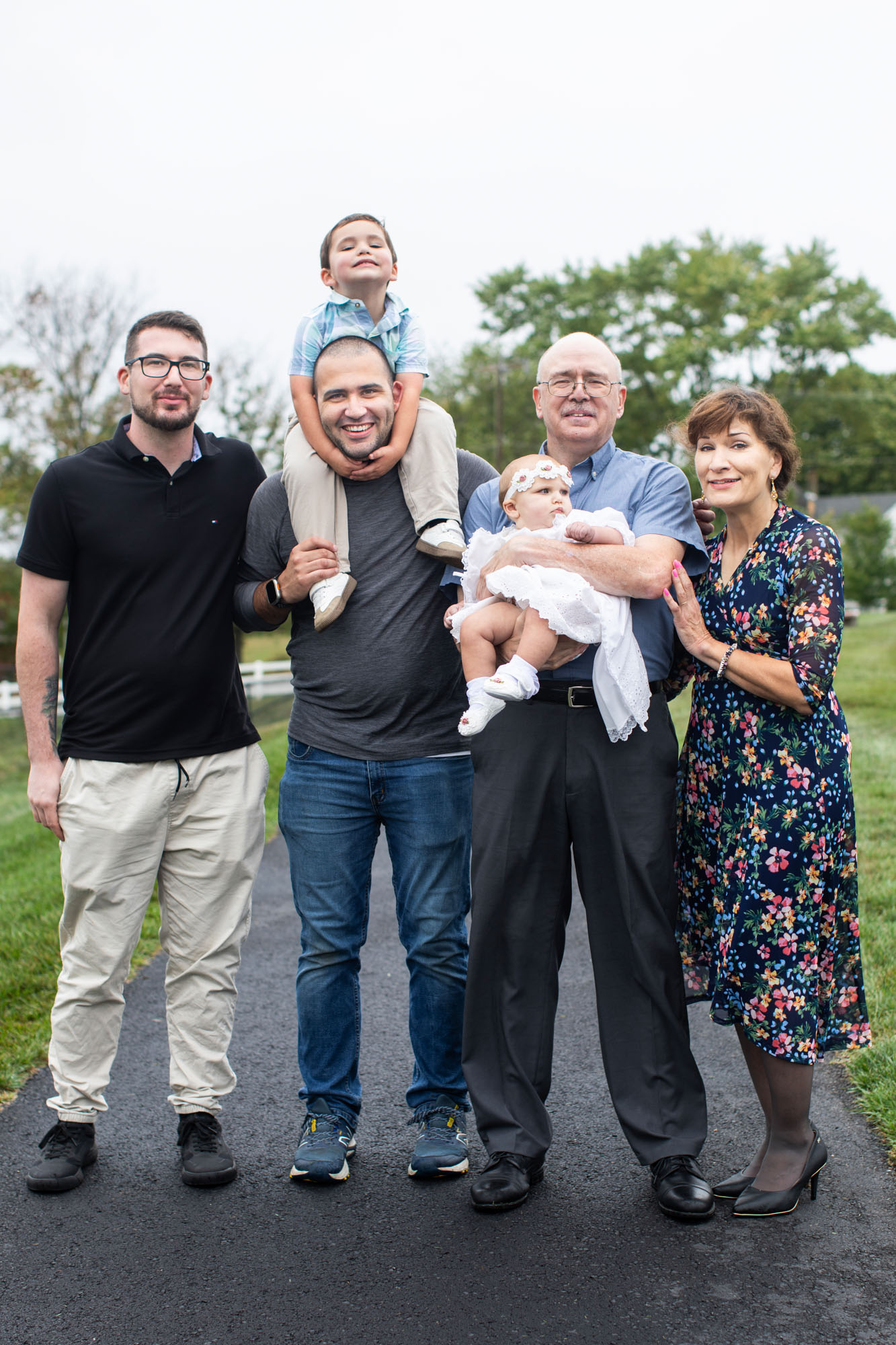Ever So Gracefully
by Robert Mitchell

Aging isn’t easy, but our responsibility to serve the kingdom of God never grows old.
It was the Monday after Thanksgiving in 2023, a day like most others. I was sitting in front of my laptop doing what I usually do: writing.
Nothing earlier in the day had given me any hint of what was ahead. I suddenly got a huge headache and had trouble concentrating. My fingers felt weak trying to type. My lips burned and my face felt frozen. It was close to dinnertime, and I went downstairs, where things didn’t get any better.
When I tried to express how I felt to my wife, I slurred my speech and sounded as if I were in a tin can. She asked me to repeat simple phrases like “We had a nice Thanksgiving.” Nothing came out of my mouth but slurred gibberish. She asked me to repeat Bible verses I’ve known my entire life like Romans 5:8 and John 3:16. Nothing but slurred gibberish again. Worse, I couldn’t even remember the verses. Something was seriously wrong, but I was in denial and hoping it would disappear.
I remembered the signs of a stroke we’d recently published in SAconnects and I had 90% of them, but this couldn’t really be happening to me, could it? My mother had lived in fear of a stroke and never had one. Was it possible that it was happening to me?
“We should go to the emergency room,” my wife pleaded before we sat on the couch to pray.
“No! I’ll be fine,” I protested, praying the symptoms would pass. “No way I’m going to the hospital.”
I kept dismissing it all and hoping I would soon return to normal.
“Let me go lie down,” I suggested.
I went back upstairs, but the headache was pounding too hard for me to lie down or sleep. I sat on the edge of the bed and continued praying.
The great unknown
The next sound I heard was a siren and an ambulance right outside my house. My loving wife had called for help against my wishes. Before I knew it, a team of paramedics was in my bedroom, and then I was on my way to the ER. I walked to the ambulance and even chatted with the crew, but I privately feared what was ahead and how my life might forever be changed.
An MRI and other tests at the hospital confirmed that I had two minor strokes, or TIAs. I also had to undergo an angiogram to determine the cause. As someone who hates needles, hospitals, and everything of that nature, I leaned heavily on my faith. My pastor and friends from church texted me prayers and Scripture about courage and trusting God, and that kept me going more than anyone knew at the time.
Every test was inconclusive in search of a cause, but doctors found that I had a narrow blood vessel in my neck and suspected that perhaps a temporary spike in my blood pressure was the culprit.
Doctors ordered a battery of tests over the next several days and found I had suffered no cognitive decline or physical side effects. I was fine and would recover. They sent me home a week or so later with “no restrictions” except to get my blood pressure under control and keep it that way.
They also told me if I had tried to go to sleep that fateful night, I might have died or been seriously debilitated. Going to the ER saved my life, and I thank my wife every day for her quick action.
Lying in my hospital bed and thinking about the future, I had to face the fact that I wasn’t 25 anymore. I had to come to the realization that I was getting older (61) and would have to do a better job of taking care of myself. One doctor asked, “Do you want to see your grandchildren grow up?” Well, yes.
A doctor who attends my church visited me in the hospital and said, “Brother, you’re going to have to get used to eating rabbit food.” I had never read a food label before in my life. Now, I’m the guy blocking the supermarket aisle reading the label on every product I buy.
Big changes ahead
Aging is something that we all must deal with. It’s not easy, physically or spiritually. In my younger days in the news business, I worked 50- and 60-hour weeks and didn’t give much thought to the toll it was taking on my body. There was always another story and another deadline to meet. The days and weeks were a blur. You would work a 12-hour day, finishing one day’s newspaper, and the next one was staring you in the face. Editors would ask you what stories you had for the next day before you even left the building. “Tomorrow will worry about itself,” I would tell them in jest, quoting Matthew 6:34.
Getting the next story was all that mattered, not my body or health. My diet was terribly unhealthy. On the rush all the time, I was a master at eating fast food in the car as I sped to a train derailment, a plane crash, or more likely a government meeting. Like a lot of men, I went to the doctor only when I was sick and couldn’t get better on my own.
I knew that all had to change for a variety of reasons, but one big one was that I wanted to spend any remaining time I have serving God now and in retirement. While I recuperated, I was constantly reminded of a quote from one of my former pastors: “Whatever time I have left, I will dedicate it to God.”
Another verse that grabbed my attention: 2 Corinthians 4:16. “Therefore we do not lose heart. Though outwardly we are wasting away, yet inwardly we are being renewed day by day.” I knew I had more to give to God.
As Christians near retirement age, which provides them more time to serve God, many have questions about how to spend their “golden years.” Should they spend the time relaxing, traveling, and luxuriating, or in Christian service? The thought of retiring to the proverbial rocking chair is anathema to many.
“Whatever time I have left, I will dedicate it to God.”

The author and his grandson.
Sage advice
Last summer, I covered the LEAD 2024 Leadership Training Conference near Pittsburgh, where one of the speakers was the venerable Commissioner Israel L. Gaither, a former national commander for The Salvation Army who has been retired for 14 years. A powerful speaker, Gaither continues to preach and serve God in retirement, and I wondered if he had any wisdom to offer about aging gracefully since he seems to be doing it so well.
“We cannot hold off the aging process, but we can—through a strong relationship under the blessing of our Lord and with determined intention—manage it,” Gaither told me (see “Advice on Aging,” p. 20). “Personally speaking, it begins with receiving every day as a precious gift. Gratitude and grace are always embraced in sacred gifts. Look for the best. Believe for the best … that is held in the gift of each day.
“And with the power of the Spirit, I refuse to believe lesser things, embrace lesser beliefs, or submit to lesser values. Love and live for Jesus under His authority.”
For those who remain healthy, the New Testament doesn’t discuss a specific retirement age; many Salvation Army officers, like Gaither, continue to serve in post-retirement. That’s a principle gleaned from Numbers 8, where the Levites who served in the temple did so from ages 25 to 50, but they could “assist their brothers” after retiring.
“Through the years and experiences, especially in this phase of my life journey, I intentionally seek to know what it is God would have me do for Him and His mission, especially through The Salvation Army,” Gaither said. “I’ve often asked God: ‘What do you want me to do?’ I do not undertake any opportunity to serve without the assurance of the Spirit that it is God’s will.”
They’re not done yet
In my local church, we often refer to our older congregants as “senior saints.” The Bible is replete with accounts of people serving into old age, including Simeon and Anna, who continued to help in the temple in Jerusalem until they saw the Messiah as a month-old child (Luke 2:22–38).
In the context of discipleship, the Apostle Paul outlines in Titus 2 how the “older men” and “older women” in the early Church were to teach younger believers how to live a devout Christian life and set the example. The message is that Christians never retire from Christ’s service and are to share their faith journey with others.
Major A. Philip Ferreira, the USA Eastern Territory’s retired officers’ representative, said the territory had 712 retired officers as of 2024 and 95 had signed post-retirement agreements to keep on serving and using their spiritual gifts.
“It is important because we have more officers retiring than are being commissioned right now, and there’s a need for officers to serve post-retirement,” Ferreira said. “The other side of that is when officers retire, they don’t cease being officers and ministers in The Salvation Army. There are opportunities, and many of them look for ways to be of further service.”
One of those retired officers is Ferreira’s own brother, Major John Ferreira, who is 71 years old and serves as the property secretary in The Salvation Army’s Northern New England Division.
“Officers are coming out of retirement to help because there’s a shortage, and officers my age are retiring in big numbers because we’re baby boomers,” Ferreira added.
The U.S. Census Bureau says that the number of older Americans (65 and older) reached 55.8 million or 16.8% of the population in 2020. In fact, the U.S. population is older than ever before. Baby boomers (those born between 1946 and 1964) began turning 65 in 2011.
Serving and being served
The mass retirement of baby boomers has been well documented in society, and some of them have found a home serving with The Salvation Army. Major Jacki Blanchard, the territory’s former community cares ministry secretary, said The Salvation Army works closely with older adults.
It’s not uncommon to see retired seniors reading to young children at a Salvation Army day care center, cooking for various ministries, or volunteering at soup kitchens, food pantries, back-to-school events, after-school programs, and a host of corps music and youth programming.
“Many of our programs have senior volunteers who are retired but still want to help,” Blanchard said. “In many corps, their best volunteers are seniors who are still involved. They’re retired, but they’re not retired in the sense that they don’t want to be doing anything.”
The Salvation Army does far more than take from seniors, however, because it’s in the organization’s DNA to serve.
Just one example: The Salvation Army’s New Jersey Division boasts a vibrant ministry to older adults, including multiple nutrition programs in Camden. Breakfast, lunch, and educational and recreational offerings are available in Newark. The division also offers a foster grandparent program for families with young children and senior companionship for shut-ins and fragile elderly, along with camping at Camp Tecumseh.
From June to October, The Salvation Army also helps seniors recharge by offering one-week respite sessions at Camp Ladore in Pennsylvania. The sessions draw over 2,000 people a year who are 50 and older.
“I don’t like referring to it as camp because it’s kind of like a resort really. It’s a very nice stay,” said Mark Scott, Ladore’s operations manager.
The camp provides meals, chapel, and activities, including boat rides on the lake.
“Folks come and relax and just pull back from society and recharge and forget about the concerns of the world for a week,” Scott said. “I also tell them it’s a chance to get recharged spiritually, too.”
Advice on Aging
from Commissioner Israel L. Gaither
Remember that you are a child of God. He will never abandon those who trust Him.
Be resolute. God remains faithful, especially in the dark places of life’s journey. And He will not fail.
Don’t go it alone spiritually or physically. Don’t isolate. Let other like-minded people into your life … a trusted believer friend.
When health issues arise, refuse to give in to the fear of what you imagine life might look like. Worry damages the mind, heart, and soul.
What you can’t figure out—surrender to God. Give it up.
Getting another chance
Blanchard said The Salvation Army also works with veterans in 43 different locations in USA East, and many of those helping are older adults.
“Seniors are a wealth of information,” she said. “They’re a wealth of experience, and that experience is invaluable in all our programs. I encourage corps officers to put their knowledge to use. If they want to help, let them do something. I know when I retire, I don’t want to sit and do nothing. If I’m still physically able to help do something, I’m all for it.”
Lt. Colonel C. David Kim, who retired from Salvation Army service in 2003 and is now 86, agreed that older adults have something to offer. One of the areas where Kim contributes is editing the Korean edition of SAconnects magazine.
The aged are sometimes dismissed in Western culture, but the opposite is true in Kim’s home country of South Korea, where older adults are revered. Kim said in Eastern culture, and particularly Korea, many who have retired from professional positions run their own businesses or are re-employed at companies in the same field or in related occupations. Others are invited to be advisers or counselors.
“In recent years, the average age of retirees is increasing. Those who are physically and mentally healthy are engaging in more social activities and their contribution in various fields seems to be expanding,” Kim said. “As a Salvation Army officer, I consider it a blessing from God that I can use the experience I gained while serving on active duty even after retirement. I’m doing my best with the opportunity I’ve been given.”
With a lot of time to think, I began to ponder my own future in that context. I used to dream of retiring and playing golf every day or becoming a season ticket holder of the New York Mets and spending my golden years watching baseball. Those aren’t my priorities anymore. I’m encouraged by a quote from one of my favorite authors and speakers, Paul Washer, who wrote, “Each passing year increases my conviction that all I have is Jesus.”
“There’s no retirement from serving God,” Blanchard told me during our interview. “No matter what your age.”

The author with his two sons, two of his three grandchildren, and his wife.
A plan for the future
I have long thought about going to China as a missionary or on regular short-term trips. I might even find a ministry closer to home, like visiting shut-ins from my local church and those stuck in the hospital like I was. I want to volunteer and play out whatever days I have left to the glory of God.
During my recuperation, I read a lot about the sovereignty of God, and it gave me both rest and peace. I can’t control the things I often worry about. We like to think we’re in control as humans, but we aren’t. Whatever God has planned for me is what will happen anyway, so why worry and fret? It’s not a platitude to say, “God is in control.” It’s the truth. I see one piece of the puzzle. He sees it all put together.
Another principle I learned during this journey is that everything that happens to us is a lesson to help others on their spiritual journey. I’ve learned that being a church elder is impossible without the spiritual gift of encouragement as I spend most of my time building into people’s lives—praying with them, helping them meet practical needs, and offering advice on how to grow spiritually. The Bible says in 2 Corinthians 1:4–5 that He “comforts us in all our troubles, so that we can comfort those in any trouble with the comfort we ourselves receive from God.” The passage continues, “For just as we share abundantly in the sufferings of Christ, so also our comfort abounds through Christ.”
I’ve been able to help many others with their health challenges—thanks to my own experience. A longtime friend of mine recently suffered a stroke, and I shared practical tips to help his recovery. I’ve also helped others in my congregation with similar health issues as mine. I make sure to share the heavenly hope that lies ahead for those in Christ Jesus.
“What we experience now is not what will always be,” Commissioner Gaither said. “Our best life, through Christ, is on the way. And aging, with its implications, will not be a factor!”
photography by Lu Lu Rivera

